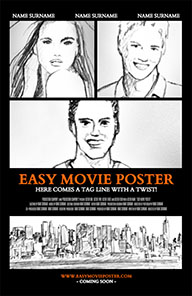Unleashing Imagination: The Future of Movie Posters with AI
Unleashing Imagination: The Future of Movie Posters with AI
Blog Article

In the ever-evolving world of cinema, movie posters have long served as the visual gateway to the stories that await audiences. These vibrant images not only capture the essence of a film but also create a buzz that draws viewers in. As technology progresses, a new player has emerged in the realm of design: artificial intelligence. The rise of the AI movie poster generator is poised to revolutionize how filmmakers and marketers approach poster creation.
Imagine a world where filmmakers can harness the power of artificial intelligence to design stunning movie posters in a fraction of the time it would traditionally take. These AI tools can analyze vast datasets of successful poster designs, understand composition, color theory, and even decipher audience preferences. This innovation not only enhances creativity but also empowers independent filmmakers with limited budgets to create eye-catching promotional material that rivals major studio productions. As we explore the future of movie posters through the lens of AI, it's clear that imagination knows no bounds.
The Rise of AI in Graphic Design
The landscape of graphic design has experienced a significant transformation with the advent of artificial intelligence. Designers are now leveraging AI tools to enhance creativity and streamline workflows. These tools can automate repetitive tasks, allowing artists to focus on the more innovative aspects of their projects. As a result, the collaboration between human intuition and machine efficiency is shaping new artistic expressions in the industry.
Explore
AI technology is not just about automation; it also brings a new level of personalization to graphic design. With advanced algorithms, AI can analyze vast amounts of data to understand trends and audience preferences, enabling designers to create more targeted and engaging visuals. This is particularly evident in the development of AI movie poster generators, which can produce unique and appealing designs tailored to specific genres and themes, enticing viewers and amplifying box office appeal.
As AI continues to evolve, it is expected to play an even more prominent role in graphic design, pushing boundaries and redefining artistic possibilities. The integration of AI into creative processes is empowering designers to explore new ideas and techniques that were previously unimaginable. This evolution not only enhances the quality of the designs but also democratizes access to professional-grade graphic design, allowing more individuals to unleash their creativity through user-friendly AI tools.
How AI Enhances Creativity in Poster Design
AI movie poster generators are transforming the way designers approach creativity, offering a vast array of tools that expand their artistic horizons. These generators can analyze existing poster designs, identifying effective elements such as color schemes, typography, and composition. By using machine learning algorithms, AI can suggest innovative designs that may not have been initially considered by human designers, sparking new ideas and pushing the boundaries of traditional poster design.
The integration of AI into the creative process allows for rapid experimentation and iteration. Designers can input various parameters, such as themes, styles, and color palettes, and the AI will produce multiple design options in a matter of minutes. This speed not only saves time but also encourages exploration of diverse aesthetics and concepts, leading to more unique and engaging posters. The technology supports a collaborative environment, where human creativity and AI's capabilities converge to create art that resonates with audiences.
Moreover, AI movie poster generators can personalize designs to cater to specific demographics or audience preferences. By analyzing trends and viewer data, AI tools can create tailored visual content that speaks directly to the intended audience. This capability ensures that posters are not just visually appealing but also strategically aligned with marketing goals. As a result, the future of poster design is not only about aesthetics but also about creating meaningful connections with viewers through the intelligent application of technology.
Challenges and Ethical Considerations
As the use of AI movie poster generators becomes more prevalent, several challenges arise, particularly around the quality and originality of the generated content. While these tools can produce visually striking designs, there are concerns that they may lack the emotional depth and nuanced understanding that human designers bring to their work. This can lead to a saturation of generic or formulaic designs that fail to resonate with audiences on a deeper level.
Another significant challenge is the issue of intellectual property. Movie posters often draw inspiration from existing artworks, and if an AI model has been trained on copyrighted material, it raises questions about ownership and appropriation. Filmmakers and studios must navigate these legal waters carefully, ensuring that the designs produced by AI do not infringe on the rights of original creators. This adds a layer of complexity to the creative process that may deter some filmmakers from fully embracing these AI tools.
Ethical considerations also extend to representation and diversity in movie marketing. AI generators function based on the data they have been trained on, which can perpetuate biases if not managed correctly. This raises concerns about the portrayal of different cultures, identities, and themes within movie posters. Ensuring that AI-generated posters reflect a diverse and inclusive perspective is essential to avoid reinforcing stereotypes or excluding marginalized groups from effective representation in the film industry.
Report this page